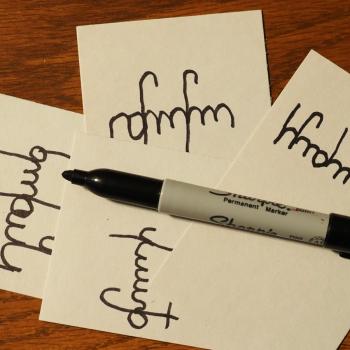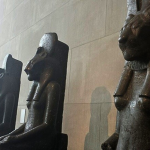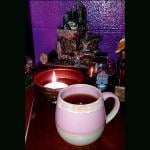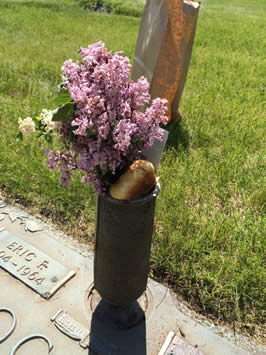
I have to admit that I’ve only come to ancestor veneration relatively recently. I’ve always been very gods-focused, and it’s taken me a while to see the value in actively honoring my ancestors, either individually or as a whole. Now, I really appreciate my growing relationship with them. I’ve found comfort in working with them, and I feel a sense of stability in my spiritual life I think had been missing for many years. Part of that shift towards honoring my ancestors came as I deepened my relationship with Freya. Part of it kicked in when my sister and I went to Sweden, home of my paternal grandfather, to dig further into our genealogy this past May. Probably the biggest part of my ancestor practice, though, has come from talking with others whom I know have solid ancestor worship practices and asking for their insights.
My biological family has never been focused too much on extended family relationships or cultural identity. We are about as generic of a midwestern American WASPish family as you can get. We have some family stories, true, but no time-honored, passed-down cultural recipes or traditions of any kind that were not pre-approved by Hallmark or Macy’s. Whenever I asked my parents about this, I was told that “we just don’t have any.” (This lack of connection with our family’s history and cultures is part of why I became interested in Heathenry to begin with.) So although I’ve been Heathen for a while, my “ancestor practice,” if I could even call it that, was something that I did superficially for a somewhat nameless group of dead people that I may or may not have any connection with. I just didn’t have many real-life role models for how to build a deeper connection with my deceased family members or larger cultures, and the practice was just not very satisfying.
When in Doubt, Ask a Friend
There’s a lot that those of us who are reconstructing dead religions can learn from living spiritual traditions. For example, I have a good friend who is both a Heathen gythia/seidhkona and a Santeria priest. One’s a dead tradition; one’s a living tradition; and both traditions focus heavily on the ancestors. I hadn’t ever really talked with her about her personal spiritual practices until one day when I was visiting and got to help her put out the libations and offerings for her various ancestor and deity altars. Here was somebody who wasn’t just talking a big talk about honoring the ancestors; she had a complex practice actively honoring them on a weekly basis. Not in a big, dramatic way, as we might do at Winternights or Samhain — just in a small, consistent, low-key kind of way. And, it occurred to me that, hey, I could do something like this, too. I just needed to get started.
I mentioned to my friend that one of my hesitations in building a relationship with my ancestors had been that I just didn’t have that close of relationships with my extended family, either living or dead; why would my ancestors care about me? I also felt awkward honoring “the ancestors” because I really couldn’t believe that some distant relative thirty generations removed would feel any connection with little old me, here and now. We talked about it, and she pointed out a few things.
We, Who Are Living
First, from the point of view of my ancestors (however I chose to define them), I–and the rest of their descendants on Earth–are the end result of all of their hard work and effort. We are their only representatives currently in the world of the living, so they have a vested interest in our success. Perhaps more importantly, while my ancestors may have many descendants scattered about the world, very few of us are currently picking up the phone. So, there are, in theory, thousands of ancestors just waiting around, willing to help, with no one requesting their services.
What if I don’t like my ancestors?
Secondly, she pointed out that I don’t have to make offerings to a specific dead relative. Sometimes we don’t have strong relationships with specific relatives in this lifetime, or sometimes our recent ancestors are just all verifiable asshats with whom we want nothing to do. Instead, I could honor a lineage of some kind with which I do connect–be it an intellectual lineage, or spiritual lineage, or the lineage of a group of people whom I admire–and make offerings to people in that lineage instead. Or, what I ended up doing was aiming further back in my family’s history than I have specific names and dates for—back before my ancestors were Christianized; back when they actually were Vikings (and farmers and traders and craftsmen, with maybe a Jarl or two thrown in) and try to connect with those family members instead. I’ve also include some of my recent ancestors, in the hope that the connection that wasn’t there while we were alive can still be formed after they are gone. So far, so good.
Keep it simple
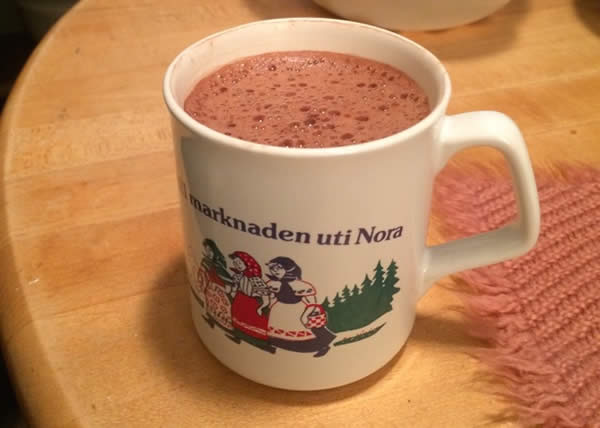
Third, offerings for the ancestors don’t need to be a big, formal affair. We are unlikely to do it “wrong.” The offerings can be something inexpensive and readily available, like coffee or candy or cereal. In fact, these type of offerings may even be more in line with the energy and blessings that the ancestors can bring to the table—smaller, more practical magicks and blessings. These “smaller blessings” are exactly the type of things the ancestors excel at.
Some unexpected benefits of ancestor worship
For example, one of the first things I found out when I started working with my ancestors in this way is that if I asked them out loud for a parking spot about a minute before I was due to arrive at a location, they could almost always guarantee that I would find one where and when I needed it without much hassle or angst. (This was in the Bay Area, often during rush hour.) They did this on almost a daily basis. It may not sound like a very impressive accomplishment, but to me it was a godsend. (Or, rather, an ancestor-send.)

Licensed under CC BY 3.0 via Wikimedia Commons.
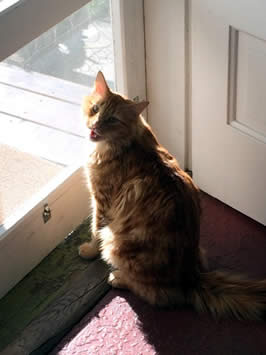
They are also very useful in watching over my cats. I have one cat–a young, energetic orange tabby–whose only desire is to roam outside. After several years of angst and many different attempted solutions, I had to eventually had admit that for him to be a happy cat, I needed to let him roam wild and free. He’s my “baby cat” (I still call him Kitten), so even though he is now a full grown cat, I still worry about him incessantly. It eventually occurred to me to explain to my ancestors that, as I have no children at the moment, my beloved cats are my babies, and they should be watched over as such. On many occasions I have asked Them to bring my red cat home at a given time, and he will usually wander back home around that time. (Or if I am really worried about him, I ask them to bring him home as soon as possible, and I will hear him meowing at the door twenty minutes later.)
(And now you probably know more about me and my relationship with my cats than you ever wanted to know. Sorry.)
These may seem like superficial requests for my honored ancestors (or anyone’s ancestors, for that matter), but when I ask Them to do these things, They reliably do it. The ancestors don’t seem to ask much from me in return–sometimes, a simple “Thanks!” is more than enough. Finally, using my connection with them in this way helps me keep my communication channel with Them active and keeps Them and Their presence always in the back of my mind. (And now I have other entities to go to when I need help with the smaller things. My Gods love me, yes, but most of them either don’t care enough about parking spots to make sure I always have one or can’t grasp the minute logistics involved in finding me a great spot.)
Long story short, you too can work with your ancestors! If you do, you may find, as I did, that honoring them and working with them is its own reward. Their attention and blessings can be a generous resource, freely given; it would be as waste to leave Them hanging.

Patheos Pagan on Facebook.

the Agora on Facebook
Happily Heathen is posted on alternate Fridays here at the Agora. Subscribe by RSS or e-mail!
Please use the links to the right to keep on top of activities here on the Agora as well as across the entire Patheos Pagan channel.






